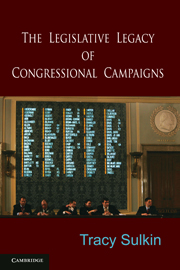Book contents
- Frontmatter
- Contents
- List of Figures
- List of Tables
- Acknowledgments
- 1 Promises to Keep?
- 2 Campaigns as Signals
- 3 Campaign Appeals and Legislative Activity
- 4 Mechanisms Underlying Promise Keeping
- 5 Promise Making and Promise Keeping on Defense and Environmental Issues
- 6 The Who, When, and Where of Follow-through
- 7 The Electoral Implications of Promise Keeping
- 8 Promises and Policy Making
- 9 Representation, Responsiveness, and the Electoral Connection
- References
- Index
9 - Representation, Responsiveness, and the Electoral Connection
Published online by Cambridge University Press: 05 June 2012
- Frontmatter
- Contents
- List of Figures
- List of Tables
- Acknowledgments
- 1 Promises to Keep?
- 2 Campaigns as Signals
- 3 Campaign Appeals and Legislative Activity
- 4 Mechanisms Underlying Promise Keeping
- 5 Promise Making and Promise Keeping on Defense and Environmental Issues
- 6 The Who, When, and Where of Follow-through
- 7 The Electoral Implications of Promise Keeping
- 8 Promises and Policy Making
- 9 Representation, Responsiveness, and the Electoral Connection
- References
- Index
Summary
The idea of an electoral connection has long been central both to normative theories of representative government and to empirical work on congressional behavior. However, there has been considerable divergence in opinion about what such a connection between the electoral and legislative arenas does and should entail. On one side lies democratic theorists' contention that campaigns are an implicit contract: that in well-functioning representative systems, candidates use their campaigns to present their plans and priorities to the public and then, to the best of their abilities, pursue these once in office (see, for example, Mansbridge 2003). From this perspective, an electoral connection means that candidates keep their promises and that elections and governing are linked through the behavior of representatives and senators as candidates and as lawmakers.
When scholars of Congress speak of an electoral connection, though, they typically mean something very different. Only rarely have the relationships between campaign appeals, legislative action, and policy outputs been the focus of attention. Instead, studies have built on Mayhew's (1974) argument about the reelection imperative to explore the ways in which legislators' activity in office affects electoral prospects (and vice versa). In this view, a linkage between electoral politics and governing behavior emerges because legislators are reelection-oriented and so act in office in ways that promote their prospects in the next race, or because relative electoral safety or vulnerability affects behavior in Congress.
- Type
- Chapter
- Information
- The Legislative Legacy of Congressional Campaigns , pp. 194 - 206Publisher: Cambridge University PressPrint publication year: 2011



